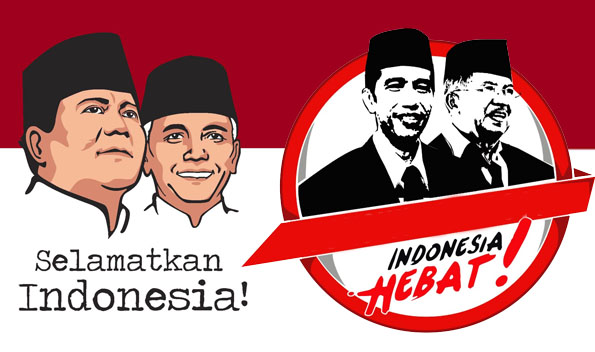One month before the July 9 presidential election day, a poll held by Kompas showed that about 40% of voters remain undecided. Not surprisingly, as voters mull between a person perceived as the epitome of change (Joko Widodo) and a former army general from pre-reform days (Prabowo Subianto), whose public image is that of a no-nonsense leader, as the nation’s future leader.
While many see Joko Widodo (Jokowi), who is given to simplicity and frugality, as the right person to bring about change, they have second thoughts whether he can really deliver. Jokowi was personally handpicked by Megawati Sukarnoputri, the chairperson of the Indonesian Democratic Party of Struggle (PDIP), as presidential candidate thanks to surveys showing his huge popularity as governor of Jakarta. However, the public harbours misgivings as Jokowi’s previous experience in governance is being mayor of Solo, a city no larger than South Jakarta, and a little over a year muddling through in cleaning up the capital city’s mess.
At the other end of the political spectrum are those who have had enough of ten years of non-assertive leadership, despite having a retired general at the helm: they welcome a leader like the suave and urbane Prabowo Subianto, who calls a spade a spade. Prabowo, a millionaire many times over and a charismatic figure who exudes unbridled confidence, also looks, well, very much presidential. Yet the public is also rather uneasy at the idea of having a cashiered military officer accused of being a serial human rights violator as president who might be tempted to reprise the New Order.
Most surveys show that for all his hands-on management style of running Jakarta as governor, a trait that should appeal to urban, educated voters, it is mostly lower-class people who have made Jokowi their choice. In contrast, Prabowo, who has been touring remote areas long before the election process started, finds most of his supporters at the upper crust of society. Interestingly, the election promises to be an all-Javanese affair: both candidates are Javanese, who make up 42% of the population, and about 6% of the voters are on Java Island.
The same Kompas poll shows Jokowi leading Prabowo by a mere 6%, down from a double-digit edge a few weeks ago. So what now stands between the candidates and the presidency are voters who are not sure if Jokowi is the face of a new Indonesia, and those who wonder if Prabowo is indeed the person who, as he says it, will be able to restore Indonesia’s international prestige as “an Asian tiger”.
The irony of it all is that, in terms of their respective vision and mission, there is little that significantly distinguishes Jokowi from Prabowo. Both put the people’s welfare at the centre of their platform and vow to improve the country’s food, energy, education and infrastructure situation. Indeed, the only time they disagreed, during one of the nationwide televised debates, is whether or not the country needs ultra-heavy 65-ton battle tanks the country’s urban terrains could not withstand in the first place.
To be sure, this is no contest between two candidates who differ on same sex marriage, development of stem cells, or universal healthcare. Or how to deal with Iran’s nuclear program and the pace of troop withdrawal from Iraq, for that matter. In fact, one knows very little how each candidate plans to raise the country’s tax base, currently at a dismal figure of 12%, or how they will address intolerance among religious groups that often leads to violent acts. In short, neither Jokowi nor Prabowo are game changers.
In any case, some countries already have an idea on what’s at work in the candidates’ minds. Jokowi, for example, made his opening statement on foreign policy by supporting the independence of Palestine, while Prabowo emphasized “good neighbour policy”. Both will not compromise on any attempt by any country that wishes to snatch away parts of the country, but are prepared to allow diplomacy run its course in a conflict involving Indonesia.
If most Indonesians failed to go through their detailed and elaborated vision and mission in order to know what the candidates’ future plans are for the nation, the three televised debates should be able do so albeit in a sweeping way. More importantly, perhaps is that the debates revealed their mannerism and gestures, both of which are often more meaningful – and enduring in the public’s mind — than the statements they make.
All eyes will be on Indonesia on July 9 as the world’s fourth largest nation (after China, India and the US), in terms of population (253 million), chooses a new leader. Some 187 million people are eligible to vote amidst the fear that turnout may only reach around 70%, still a respectable figure by most standards. (In 2004 and 2009, respectively 23% and 28% decided to stay home.)
It is noteworthy that some 67 million Indonesians, or about one-third of total registered voters, are eligible to take part in the presidential election for the first time. If the election appears to be a toss-up between two formidable candidates running neck and neck and sharing what is virtually a common platform, it is also about Indonesians’ preference for the style with which the nation will be governed in the next five years.




